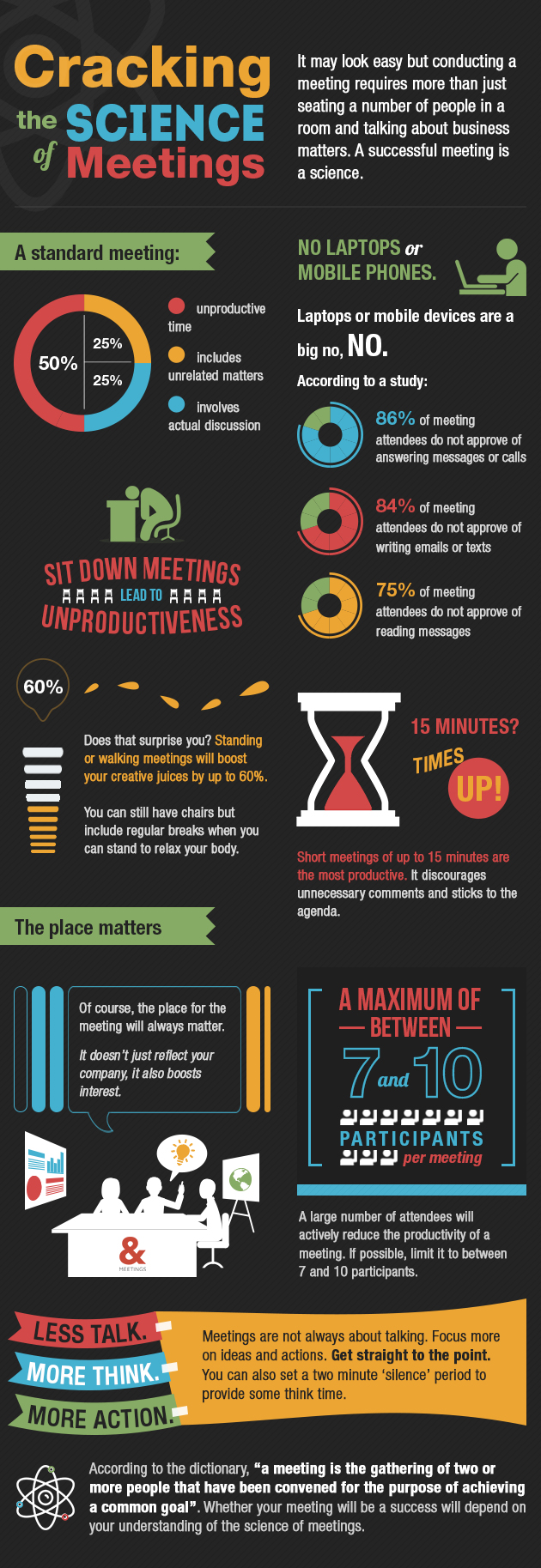INFOGRAPHIC: Cracking the science of meetings
It may look easy but conducting a meeting requires more than just seating a number of people in a room and talking about business matters. A successful meeting is a science.

It may look easy but conducting a meeting requires more than just seating a number of people in a room and talking about business matters. A successful meeting is a science.
• A standard meeting:
Is unproductive 50% of the time
Includes unrelated matters 25% of the time
Only 25% of the time involves actual discussion
Is unproductive 50% of the time
Includes unrelated matters 25% of the time
Only 25% of the time involves actual discussion
• Sit down meetings lead to unproductiveness
Does that surprise you? Standing or walking meetings will boost your creative juices by up to 60%.
You can still have chairs but include regular breaks when you can stand to relax your body.
Does that surprise you? Standing or walking meetings will boost your creative juices by up to 60%.
You can still have chairs but include regular breaks when you can stand to relax your body.
• The place matters
Of course, the place for the meeting will always matter. It doesn’t just reflect your company, it also boosts interest.
Of course, the place for the meeting will always matter. It doesn’t just reflect your company, it also boosts interest.
• No laptops or mobile phones
Laptops or mobile devices are a big no, no. According to a study:
• 86% of meeting attendees do not approve of answering messages or calls
• 84% of meeting attendees do not approve of writing emails or texts
• 75% of meeting attendees do not approve of reading messages
• 86% of meeting attendees do not approve of answering messages or calls
• 84% of meeting attendees do not approve of writing emails or texts
• 75% of meeting attendees do not approve of reading messages
• 15 Minutes? Times up!
Short meetings of up to 15 minutes are the most productive. It discourages unnecessary comments and sticks to the agenda.
Short meetings of up to 15 minutes are the most productive. It discourages unnecessary comments and sticks to the agenda.
• A maximum of between 7 and 10 participants per meeting
A large number of attendees will actively reduce the productivity of a meeting. If possible, limit it to between 7 and 10 participants.
A large number of attendees will actively reduce the productivity of a meeting. If possible, limit it to between 7 and 10 participants.
• Less talk. More think. More action
Meetings are not always about talking. Focus more on ideas and actions. Get straight to the point. You can also set a two minute ‘silence’ period to provide some think time.
Meetings are not always about talking. Focus more on ideas and actions. Get straight to the point. You can also set a two minute ‘silence’ period to provide some think time.
According to the dictionary, “a meeting is the gathering of two or more people that have been convened for the purpose of achieving a common goal”. Whether you meeting will be a success will depend on your understanding of the science of meetings.
Now you know how to ‘crack the science’ book a meeting room in London to put your new skills into practise.
Posted by Sara Cano
Share this post
Tags
- Career Development
- Celebrity Meetings
- Conferences
- Confidence
- Exhibitions
- Historic Meetings
- How to Interview Effectively
- Human Resources
- In The Press
- Meetings and Conferences
- Monarchy
- News
- Our Team
- Personal Development
- Personnel
- Presentation Techniques
- Teamwork
- Top Tips for Meetings
- Training & Workshops
- Video Conferences



